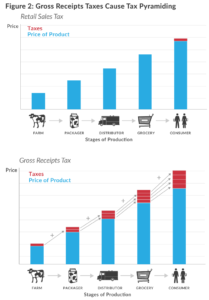As the members of the Tax Panel continue to deliberate about how to design a better tax structure for Connecticut, one of the ideas that comes up is a gross receipts tax in place of the corporate income tax.
Most of us are unfamiliar with the gross receipts tax, and for good reason. Our country experimented with the tax during the Great Depression and confirmed what economists have said about the gross receipts tax for nearly 300 years: It’s the worst.
After the 1940s, we didn’t see a new gross receipts tax until 2002, when New Jersey tried to implement an updated version of the tax. By 2006 it was repealed, but the idea continues to reemerge despite an overwhelming consensus that you can’t “fix” the gross receipts tax.
But what is it and what makes it so terrible?
The gross receipts tax is most easily understood when compared to a sales tax.
With a sales tax, consumers pay the tax on the final transaction. This is easy to calculate and predict. I go to a store and purchase a pair of headphones for 20 dollars plus a 5 percent tax of 1 dollar.
The gross receipts tax is applied to every transaction but at a lower rate. This means that the total tax burden passed on to you, the customer, depends on the number of transactions that went into producing the good you are purchasing.
Supporters will attempt to sell the gross receipts tax by claiming it will make businesses pay their fair share, but that’s not how taxes work. Businesses divide the impact of their tax burden between their customers, employees and investors. Some companies may protect customers from portions of the gross receipts tax, but nearly all will pass along at least part of the cost.

Some may point to companies like General Electric, suggesting that the gross receipts tax is the only way to make them pay more. However, some of the wealthiest businesses are also the least impacted by the gross receipts tax. Businesses involved in finance, IT, or law aren’t transaction heavy so they end up generating a very small net tax burden under a gross receipts tax. On the other hand, businesses in food production and manufacturing can experience five times higher tax pyramiding.
The gross receipts tax would hit lower-income residents and smaller businesses the hardest. Your local pizza joint and Sikorsky would face a higher effective tax rate than an investment firm in Fairfield County. That doesn’t seem fair.
The gross receipts tax is regressive even within industries. When faced with a gross receipts tax, larger companies are able to invest in vertical integration. They can purchase businesses further up or down the production chain so they no longer pay taxes on transactions within the new, even larger company. Instead of trading between many small businesses to create a final product, it becomes a large business that produces the entire product.
Once a vertically integrated company is formed, the gross receipts tax acts as a barrier against competition. Smaller firms can’t compete because the gross receipts tax artificially inflates the prices of their products.
Since 2002, several states have tried to implement a gross receipts tax with complex systems of deductions, credits, abatements and exemptions in an effort to avoid some of the pitfalls outlined above. Up to now, all have failed. Nevada is the next state to try this experiment, but odds are they will fail as well. This is because the fundamental structure of the gross receipts tax is flawed. By taxing business inputs, it creates distortions, regressive impact and promotes big business.

